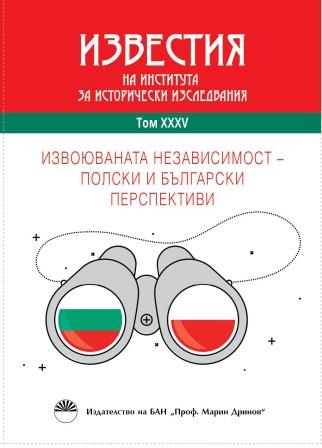Памет и национално достойнство: сталинските репресии спрямо българи и поляци в Централна Азия. Съвременни оценки и политики
Memory and National Dignity: Stalin’s Repressions against Bulgarians and Poles in Central Asia. Contemporary Assessments and Policies
Author(s): Rumyana ChukovaSubject(s): History, Political history, Recent History (1900 till today), Special Historiographies:, WW II and following years (1940 - 1949), History of Communism
Published by: Институт за исторически изследвания - Българска академия на науките
Keywords: Polish-Russian relations; ethnic cleansing; population transfers; Soviet repressions of ethnic Poles and Polish citizen; Bessarabian Bulgarians; Taurian Bulgarians; NKVD; Gulag; Anders’ Army;
Summary/Abstract: Based on published documents from Russian archives as well as literature on the subject, the paper examines the underlying causes and specific details of the Soviet repressive policies in regard to Poles and ethnic Bulgarians during the 1930s and 1940s. These people became victims of ethnic cleansing, population relocation and forced resettlement in underpopulated and remote areas in Central Asia, mainly in Kazakhstan and Uzbekistan. During the WWII period forced deportations of entire nationalities and ethnic minorities, as well as labour force transfers, were instruments of Soviet national policies. Poles were one of the first national groups inhabiting at that time the prewar territory of the Soviet Union who were deported to special settlements. They were accused of “anti-Soviet” acts and nationalistic agi¬tation and were the target of mass operations of the NKVD. There were four waves of mass deportations of Polish families to Central Asia in 1940–1941. Bessarabian, Crimean and Taurian Bulgarians were collectively punished by the So¬viet repressive apparatus for their alleged collaboration with the enemy during WWII. The political repressions against the Bulgarians, starting with deportations to special settlements in the late 1930s, and culminating in the operations of mass deportation in March-April 1944, can be perceived as a form of ethnic cleansing. After Soviet troops occupied Bulgaria on 9 September 1944, the Taurian Bulgarians who had migrated to the land of birth of their ancestors and had been granted Bulgarian citizenship by King Boris III were arrested and deported to the Kazakhstan deserts because the Soviet authorities ignored their new legal status. The author also deals with the problem of collective memory of the Communist past as it is preserved in political consciousness and presented in contemporary national his torical narratives in Poland and Bulgaria. Polish society and institutions like the Institute of National Remembrance keep the memory of the victims of the Stalinist terror alive. A number of activities for preserving the memory of the Poles sent to Central Asia have been carried out in collaboration with institutions and scholarly organizations from the Central Asian republics. Unlike the Polish example, Bulgarian society is not well enough informed about the mass Stalinist repressions against political emigrants to the Soviet Union and the Bulgarian ethnic minority there. The main reason for this is that published studies are the subject of direct politicization both among professional researchers and the broader public. Another issue concerns the lack of a Bulgarian Institute of National Remembrance whose possible establishment would encourage multidisciplinary research efforts for studying the Communist past.
Journal: Известия на Института за исторически изследвания
- Issue Year: 35/2020
- Issue No: 1
- Page Range: 127-150
- Page Count: 24
- Language: Bulgarian
- Content File-PDF

